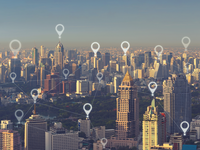The smart city market is very much in its infancy. Right now, marketing for smart cities is much like marketing for the AR and VR space; except even smaller. Some of the most promising and far-reaching applications for smart cities include transportation, water and energy management, and environmental protection.
However, the opportunities for marketers in a smart city are far off right now. They’re limited to using disparate devices and trying to create connections between them. These include smart speakers, smartphones, smart sensors, etc. However, in the future, there is huge potential for marketing in smart cities.
Increasing Touchpoints

Marketing for smart cities will depend on a greater number of touchpoints. With billions of sensors being installed in buildings, vehicles, parking meters, etc. companies will have more data to play with. So much more data will mean increasing insights and more areas to exploit economically and socially for marketing.
If an intersection is known for causing traffic jams, ride-hailing services will identify it as a red zone. If an area is known to be particularly arid and hot, companies can tap certain households for discounts on ACs. Marketing opportunities like these will keep revealing themselves in smart cities.
Location-Based Marketing
Location-based marketing will also be a huge feature of smart cities. Since smart cars, smartphones, smart tablets, etc. will all be connected it’ll be easier to tap into them. Companies will find instances to market their products to customers in certain locations. For instance, customers driving by restaurants will receive recommendations or discounts based on their eating history. Entering certain locations will result in ads popping up for local schools or grocery stores, etc.







